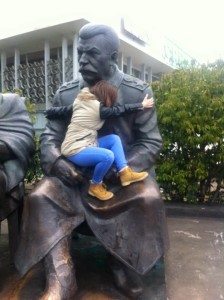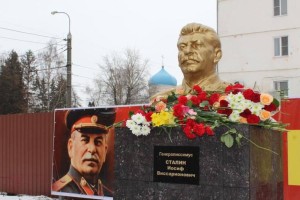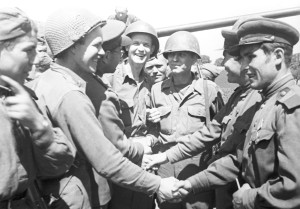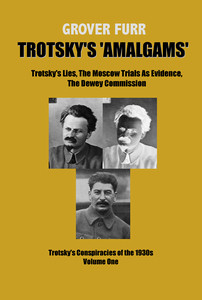From: Business Insider, 12/18/2015 (http://www.businessinsider.com/ap-russia-opens-new-stalin-museums-grapples-with-his-legacy-2015-12?IR=T)
KHOROSHEVO, Russia (AP) — A bust of Josef Stalin stands on the front lawn of a house-turned-museum in this small village, where the Soviet leader is said to have stayed the night on his visit to the front during World War II.
Inside, the museum director, a sturdy woman armed with a wooden pointer, takes a group of preteen students around the two-room house where Stalin strategized with his generals in August 1943 as the Red Army battled to drive out the Nazi troops.
Scholars estimate that under Stalin more than 1 million people were executed in political purges. Millions more died of harsh labor and cruel treatment in the vast gulag prison camp system, mass starvation in Ukraine and southern Russia and deportations of ethnic minorities.
But as Russia faces isolation abroad and deepening economic troubles at home, retelling an abridged account of triumphs past has become increasingly fashionable. President Vladimir Putin frequently cites the Soviet victory in World War II — Stalin’s most touted achievement — in vowing to stand up to the West and defend Russia’s interests.
“Of course, we have started to look at Stalin in a more favorable light,” said Sergei Zaborovsky, a tour operator with the Military Historical Society. “Why now? Maybe it’s because the situation in the world isn’t the best. We need strength. We need something to unite us.”
After the fall of the Soviet Union in 1991, Stalin’s legacy was kept alive by the Communist Party, whose members carried his portrait to rallies, extolled his modernization policies and faithfully celebrated his birthday on Dec. 21. His real birth date is now believed to be Dec. 18, but the Communists will still wait until Monday to place flowers at his grave on Red Square. After Stalin’s death in 1953, his body was placed in the Lenin Mausoleum, but in 1961 it was moved to a graveyard behind it after his successor denounced Stalin’s cult of personality.
While the aging Communists are photogenic but largely ignored, their airbrushed version of Stalin has gone from fringe to increasingly mainstream. The number of Russians who say they have a negative view of Stalin has steadily declined, from 43 percent in 2001 to 20 percent today; a growing majority reports that they cannot properly judge the leader’s time in office.
Museums and busts honoring Stalin have been sprouting up around Russia with an increasing regularity, especially this year as the nation commemorates the 70th anniversary of victory in what Russians call the Great Patriotic War.
The museum in Khoroshevo, about a three-hour drive from Moscow, is among those opened this year in the Tver region by the Military Historical Society, which is under the direction of Russia’s culture minister. It is part of a “Path to Victory” tour, which also includes war monuments and a burned-out building destroyed during the war.
The museum focuses on Stalin’s military and economic triumphs. It does not mention any military shortcomings or any other negative aspect of the war or Stalin’s three decades in power.
The director of the Khoroshevo museum, Lydia Kozlova, responds curtly to the idea that the museum gives a one-sided impression to visitors. She is equally terse when discussing “Western” historical interpretations that write off Stalin as a dictator. “This is not a Stalin Museum,” she repeats throughout trip arrangements and throughout the tour.
“Stalin wasn’t an angel — far from it — but he looked after the safety of his citizens,” said Kozlova, surrounded by placards with the leader’s picture and glowing reviews of his military prowess. “The point of this museum is to guard our history, to protect the facts.”
Recasting Stalin as a great leader who made Machiavellian calculations is worrying at best, says Memorial, a Russian human rights organization that has gathered historical records about Soviet political repressions and works to perpetuate the memory of the victims.
Memorial has called for Stalin’s image to be banned. “Of course we don’t like that this museum was opened,” said Yelena Zhemkova, a historian with the organization.
While the Kremlin has shied away from either categorically condemning or condoning Stalin, there has been a crescendo in efforts to muzzle individuals, museums and non-government organizations that do not “properly” interpret history and to bring the historical narrative under government control.
Memorial this year was declared a “foreign agent,” a label that brings stigma and slows the group’s work. The respected Perm-36 gulag museum was also labeled a foreign agent earlier this year and was forced to close under pressure from local authorities who claimed the museum did not adequately show the flourishing cultural life in the labor camps. A new museum later reopened under the same Perm-36 name and with exhibits described as more “historically accurate.”
A large, state-run gulag museum opened in the center of Moscow on the eve of the Oct. 30 day of remembrance of the victims of political repressions. While Memorial takes this as a positive sign, “it is still government owned,” cautions Zhemkova. The museum exhibits avoid a critique of the Soviet system, but provide an accurate depiction of the gulag system.
A far-reaching de-Stalinization campaign is unlikely to take place anytime soon, says Lev Gudkov, the director of the independent Levada Center, who has conducted extensive polling on public perception of Stalin. Acknowledging that the Soviet system was criminal and that the entire Soviet system was criminal would lead to a “complete collapse of identity” for many Russians, Gudkov said. “They don’t deny what Stalin did, but they prefer to look at him as the majestic sovereign, rather than the controversial ruler.”
Leonid Kavtza, a history teacher at Gymnasium 1543 in Moscow, says Russians still harbor ideas of imperial greatness.
“They’re harkening back on something great that can never be recreated. Even when I was a young child under (Soviet leader Leonid) Brezhnev, I remember hearing ‘If only Stalin was here.’ If the director of the shop sold spoiled produce ‘If only Stalin was here,’ If there was a line at the clinic, ‘If only Stalin was here,'” Kavtza said. “But there was no such person who did this. They’re thinking of a mythical Stalin.”
And thus far, the federal history curriculum has done nothing to counter these assumptions of Stalin’s greatness. In the wake of the Kremlin’s hands-off approach toward Stalin and exaltation of World War II, a growing group of people have filled the silence with measured praise.
“It’s important not to forget those who helped create the peaceful environment we live in today,” Irina Mikhailova, who teaches at a school in Khoroshevo. “The Stalin museum is very important to us. We’re proud to have it here.”
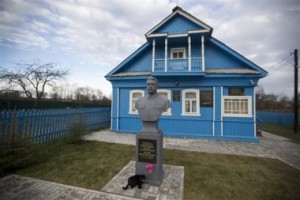
In this Wednesday, Dec. 9, 2015 photo, a bust of Soviet leader Josef Stalin stands on the front lawn of a house-turned-museum in the village of Khoroshevo, west of Moscow, Russia. The Stalin museum was opened this year in this small village where the Soviet leader is said to have stayed the night on his visit to the front during World War II. The sign on the monument reads “Chairman of the State Defense Committee, Supreme Commander in Chief Josef Stalin.” (AP Photo/Pavel Golovkin)
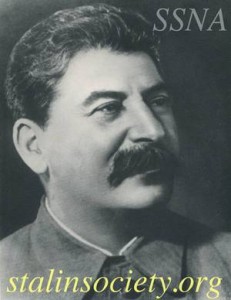 The SSNA is the result of many months of hard work and many years of hopeful emulation. In London, in 1991, the Stalin Society-UK was formed as an organization whose stated goal was to refute anti- communist and anti-Stalin libels and slanders through rigorous scholarly research and vigorous debate. Over the years, the Stalin Society-UK has contributed a number of very influential and well-received articles dealing with the Stalin Period of Soviet history, and has conducted and sponsored numerous education events, forums, and symposia. The success of the Stalin Society in Britain made many of us on this side of the Atlantic wish that we had a similar organization on these shores.
The SSNA is the result of many months of hard work and many years of hopeful emulation. In London, in 1991, the Stalin Society-UK was formed as an organization whose stated goal was to refute anti- communist and anti-Stalin libels and slanders through rigorous scholarly research and vigorous debate. Over the years, the Stalin Society-UK has contributed a number of very influential and well-received articles dealing with the Stalin Period of Soviet history, and has conducted and sponsored numerous education events, forums, and symposia. The success of the Stalin Society in Britain made many of us on this side of the Atlantic wish that we had a similar organization on these shores.
